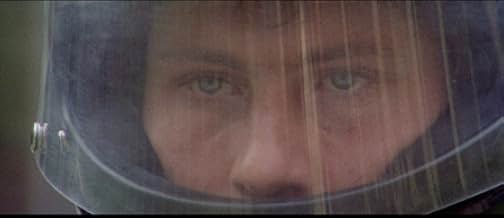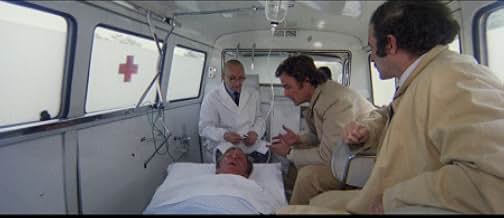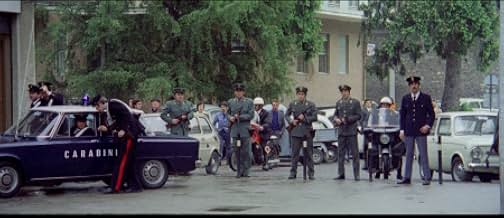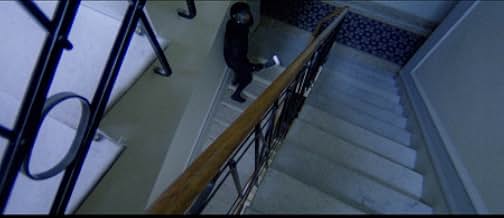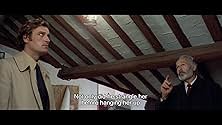IMDb RATING
6.9/10
2.9K
YOUR RATING
A district attorney and two inspectors discover that a girl's apparent suicide is linked to a teenage prostitution ring which employs a motorcycle-riding killer to tie up loose ends.A district attorney and two inspectors discover that a girl's apparent suicide is linked to a teenage prostitution ring which employs a motorcycle-riding killer to tie up loose ends.A district attorney and two inspectors discover that a girl's apparent suicide is linked to a teenage prostitution ring which employs a motorcycle-riding killer to tie up loose ends.
- Director
- Writers
- Stars
Sherry Buchanan
- Silvia Polvesi
- (as Cheryl Lee Buchanan)
- Director
- Writers
- All cast & crew
- Production, box office & more at IMDbPro
6.92.8K
1
2
3
4
5
6
7
8
9
10
Featured reviews
Gripping Giallo, if a little misanthropic...
Although the 'Giallo' genre officially began with Mario Bava's 'Ragazza Che Sapeva Troppo' (aka 'Evil Eye', or 'The Girl Who Knew To Much') in 1963, continuing with the same director's 'Sei Donne Per L'Assassino' ('Blood and Black Lace', 1964), it wasn't really until the commercial success of Dario Argento's 1969 debut, 'L'Uccello dalle Piuma di Cristallo' ('The Bird With the Crystal Plumage') that it really got underway to become a staple of Italian cinema in the 1970's. The films essentially were bloody thrillers in which the primary thrill was in watching pretty young girls being stalked and dispatched by anonymous, leather-gloved assassins. Stylistically these films forced the audience to identify with the killer, featuring lengthily protracted and elaborately staged sequences of women in terror strung together by a convoluted whodunnit plot along the lines of those of early twentieth century British crime-writer Edgar Wallace.
In fact, director Massimo Dallamano's previous film, 'Whatever Happened to Solange?' ('Cosa Avete Fatto a Solange?' 1972) was based on an Edgar Wallace novel. The follow-up takes it's cue from the same film by also setting itself within a girl's school, giving us a whole host of young nubiles around which to build the plot. The film opens with a rousing score courtesy of Stelvio Cipriani, a big-band romp through 70's flower-power accompanied by shots of the young girls getting on and off of their boyfriends scooters outside the school gates. This is followed by the discovery by the police of a young girl swinging naked from the rafters of an attic in a nearby deserted house after an anonymous tip off.
As the Italian title 'La Polizia Chiede Aiuto' (The Police Ask For Help) suggests, and what sets this apart from its predecessor and most of the Giallo films of the period, is that a lot of time is devoted to the police's detective work and the milieu of the police themselves as opposed to those of the potential victims, bringing the film more in line with the policier drama than pure 'Giallo'. For the most part the film follows these investigations from suspect to suspect, with each plot point highlighted by a lengthy flashback. A motorcycle chase forms one of the action set-pieces alongside the usual suspense scenes, including a taut sequence in which the female detective (Giovanni Ralli) is stalked by the leather-clad, helmeted killer with a meat cleaver. The gorier pay-offs mainly occur towards the end, once the cleaver has made its initial appearance, but along the way we discover a mutilated body in the back of a car, and the blood spattered bath in which it was dismembered.
If all this sounds rather perfunctory so far, it is the sheer bleakness of the film that distinguishes it. The initial murder is linked to the discovery of a school girl prostitution ring, and this central concept pretty much summarises the whole tone of the film. With a potential political scandal hinted at, and a scene in which the Claudio Casinelli's police investigator lies to the press to buy more time, the general milieu invoked is a corrupt and sordid one, where corruption and vice are masked by the superficially angelic innocence of the girls involved. The deadpan and po-faced narrative includes lengthy scenes of the police listening intently and repeatedly to tapes made of the call-girls' meetings, and graphic post-mortem descriptions of the victims. Salacious tit-bits like these are so deeply engrained within the complex plot that forces one is forced into a particularly bizarre and twisted perspective of the world by the accumulation of such elements.
Director Dallamano was a cinematographer turned director who had worked on a number of spaghetti Westerns in the 60's including Sergio Leone's 'Per un pugno di dollari' ('Fistful of Dollars', 1964). Prior to this he had made a number of films including adaptations of Oscar Wilde's 'Dorian Gray' (1970) and Leopold von Sacher-Masoch's 'Venus in Furs' ('Le Malizie de Venere', 1969)
'La Polizia Chiede Aiuto' also sports features an undistinguished supporting role from former Stranger on a Train, Farley Granger (Alfred Hitchcock, 1951). It is competently made, fast moving and gripping in places. It's worth checking out, but a maybe a little too serious in both its sleazy theme and its approach to prove a major crowd pleaser.
In fact, director Massimo Dallamano's previous film, 'Whatever Happened to Solange?' ('Cosa Avete Fatto a Solange?' 1972) was based on an Edgar Wallace novel. The follow-up takes it's cue from the same film by also setting itself within a girl's school, giving us a whole host of young nubiles around which to build the plot. The film opens with a rousing score courtesy of Stelvio Cipriani, a big-band romp through 70's flower-power accompanied by shots of the young girls getting on and off of their boyfriends scooters outside the school gates. This is followed by the discovery by the police of a young girl swinging naked from the rafters of an attic in a nearby deserted house after an anonymous tip off.
As the Italian title 'La Polizia Chiede Aiuto' (The Police Ask For Help) suggests, and what sets this apart from its predecessor and most of the Giallo films of the period, is that a lot of time is devoted to the police's detective work and the milieu of the police themselves as opposed to those of the potential victims, bringing the film more in line with the policier drama than pure 'Giallo'. For the most part the film follows these investigations from suspect to suspect, with each plot point highlighted by a lengthy flashback. A motorcycle chase forms one of the action set-pieces alongside the usual suspense scenes, including a taut sequence in which the female detective (Giovanni Ralli) is stalked by the leather-clad, helmeted killer with a meat cleaver. The gorier pay-offs mainly occur towards the end, once the cleaver has made its initial appearance, but along the way we discover a mutilated body in the back of a car, and the blood spattered bath in which it was dismembered.
If all this sounds rather perfunctory so far, it is the sheer bleakness of the film that distinguishes it. The initial murder is linked to the discovery of a school girl prostitution ring, and this central concept pretty much summarises the whole tone of the film. With a potential political scandal hinted at, and a scene in which the Claudio Casinelli's police investigator lies to the press to buy more time, the general milieu invoked is a corrupt and sordid one, where corruption and vice are masked by the superficially angelic innocence of the girls involved. The deadpan and po-faced narrative includes lengthy scenes of the police listening intently and repeatedly to tapes made of the call-girls' meetings, and graphic post-mortem descriptions of the victims. Salacious tit-bits like these are so deeply engrained within the complex plot that forces one is forced into a particularly bizarre and twisted perspective of the world by the accumulation of such elements.
Director Dallamano was a cinematographer turned director who had worked on a number of spaghetti Westerns in the 60's including Sergio Leone's 'Per un pugno di dollari' ('Fistful of Dollars', 1964). Prior to this he had made a number of films including adaptations of Oscar Wilde's 'Dorian Gray' (1970) and Leopold von Sacher-Masoch's 'Venus in Furs' ('Le Malizie de Venere', 1969)
'La Polizia Chiede Aiuto' also sports features an undistinguished supporting role from former Stranger on a Train, Farley Granger (Alfred Hitchcock, 1951). It is competently made, fast moving and gripping in places. It's worth checking out, but a maybe a little too serious in both its sleazy theme and its approach to prove a major crowd pleaser.
High brow giallo
A young naked schoolgirl is found hanged in a room locked from the inside, the police suspect suicide, until that is the clues seem to point in the direction of murder. So when the police led by Inspector Silvestri(Claudio Cassinelli) with the assistance of the asst district attorney Vittoria Stori (Giovanna Ralli) realise that they are investigating a teen prostitute ring with some highly influential people involved, they know they are going to have a tough time convicting anyone and sure enough their investigation is dogged with interference and dead ends. Dallamano director of What have they done to Solange? again returns to his schoolgirl in peril themed story and like its predecessor it's a highly controversial topic that is handled professionally and intelligently. Despite its topic, there's very little in the way of visual sleaziness here, the offences against the girls are confined to tape recordings the police have and its from these that they build their case. The film is in fact only half Giallo and plays more like a Poliziotteschi (Italian police procedure film), we only get brief glimpses of the leather clad killer as he tries to cover up his identity by killing those who might be able to give him away. Stelvio Cipriani again provides an excellent score, the film looks good visually, no more than you'd expect from a director who used to ply his trade as a cinematographer, there's also a very memorable chase scene that livens up the film immensely. Claudio Cassinelli and Cortese provide some fine acting in their respective roles, if there is such thing as a high brow Giallo this must surely be it.
Cop this Italia exploitation
Though the film's innocent, optimistic music score, serving it's title, which I really favor, will be one which will stay in my head, this Italian exploitation crime drama doesn't fare too badly, if not for a crappy and simple ending. It is a stylized effort, bursting with some nice graphic shock gore here and there, and a cool, anger driven cop character, heralding it. A full masked psycho on a motorbike, is the responsible killing hand, to a first initially thought suicide of a young girl, caught up in a schoolgirl prostitution ring, involving many a high up party of clientele. A great car/bike chase through the paved streets of our Italian city, some shock scare moments, some T and A and some kinky pimp talk via secret tape recordings, doesn't amount to a compact drama, where this one falls short, especially in the thriller, construction stakes. And yet again, we're still haunted by that music score. Cool frank movie poster, not the one illustrated on this IMDB page.
6.5/10
6.5/10
WHAT HAVE THEY DONE TO YOUR DAUGHTERS? (Massimo Dallamano, 1974) ***
While the original Italian title – THE POLICE ASKS FOR HELP – clearly pigeonholes this one in the then-popular (and incredibly prolific) poliziottesco genre, the English title under which it is better known around the world – WHAT HAVE THEY DONE TO YOUR DAUGHTERS? – implies a giallo in the same vein as Dallamano’s best-known film, WHAT HAVE THEY DONE TO SOLANGE? (1972). In any case, while both elements are effectively present – a hatchet-wielding murderer is the subject of the climactic manhunt – the police procedural themes are more prevalent.
The film deals with a teenage suicide which eventually uncovers a child prostitution ring which, as usual, includes not just the petty sleazy oddballs (here personified by Franco Fabrizi) but also high-profile professionals (a celebrated doctor) and high-ranking government officials (a Minister). The cast is surprisingly good for this type of genre effort: Claudio Cassinelli (as the investigating Police Chief), Giovanna Ralli (unusually cast as a female D.A.), Mario Adorf as the policeman who finds the first body and also discovers that his own teenage daughter was once a “victim” of these perverts, the afore-mentioned Fabrizi and Hollywood veteran Farley Granger in a smallish role as the first victim’s father.
As usual for Italian genre movies, the music score is an asset and here it is provided by Stelvio Cipriani whose motif, while simple and repetitive, is extremely effective given that it involves children singing gibberish (and thus commenting on the main theme of the movie itself even through its performers). Alarmingly, the end titles claim that every year in Italy, 8000 teenagers run away from home but only a small percentage returns to the fold – the majority are never found!
The film deals with a teenage suicide which eventually uncovers a child prostitution ring which, as usual, includes not just the petty sleazy oddballs (here personified by Franco Fabrizi) but also high-profile professionals (a celebrated doctor) and high-ranking government officials (a Minister). The cast is surprisingly good for this type of genre effort: Claudio Cassinelli (as the investigating Police Chief), Giovanna Ralli (unusually cast as a female D.A.), Mario Adorf as the policeman who finds the first body and also discovers that his own teenage daughter was once a “victim” of these perverts, the afore-mentioned Fabrizi and Hollywood veteran Farley Granger in a smallish role as the first victim’s father.
As usual for Italian genre movies, the music score is an asset and here it is provided by Stelvio Cipriani whose motif, while simple and repetitive, is extremely effective given that it involves children singing gibberish (and thus commenting on the main theme of the movie itself even through its performers). Alarmingly, the end titles claim that every year in Italy, 8000 teenagers run away from home but only a small percentage returns to the fold – the majority are never found!
Excellent Police Story
After an anonymous phone call, a teenage girl is found hanged in the attic of an old building in Lombardia and the police assume she committed suicide. The efficient Insp. Silvestri (Claudio Cassinelli) and the newcomer Asst. DA Vittoria Stori (Giovanna Ralli) assume the case and while checking the location, Insp. Silvestri sees a middle age man, Bruno Paglia (Franco Fabrizi), taking pictures of the place from a nearby building. The man is arrested and soon Insp. Silvestri learns that the 14-year-old victim, Silvia Polvesi (Cheryl Lee Buchanan), was part of a teenage prostitution ring, including the beloved daughter of Insp. Valentini (Mario Adorf). His further investigation with the Asst. DA Stori discover a tape where sexual encounters with important names in the Italian society are recorded. Meanwhile a motorcycle rider wearing black uses a cleaver to get rid of suspects and witnesses.
"La polizia chiede aiuto", a.k.a. "What Have They Done to Your Daughters?", is an excellent police story and one of the best Italian movies of the genre. The plot is surprisingly believable and with no flaws or tricks that are usual in giallos. Claudio Cassinelli and Giovanna Ralli have magnificent performances and the conclusion is realistic. My vote is eight.
Title (Brazil): "O Que Eles Fizeram a Suas Filhas?" ("What Have They Done to Your Daughters?")
"La polizia chiede aiuto", a.k.a. "What Have They Done to Your Daughters?", is an excellent police story and one of the best Italian movies of the genre. The plot is surprisingly believable and with no flaws or tricks that are usual in giallos. Claudio Cassinelli and Giovanna Ralli have magnificent performances and the conclusion is realistic. My vote is eight.
Title (Brazil): "O Que Eles Fizeram a Suas Filhas?" ("What Have They Done to Your Daughters?")
Did you know
- TriviaFarley Granger's voice was dubbed by another actor in the English-language version.
- GoofsIn the scene when Cassinelli and Ralli are looking at a strip of film footage, they repeatedly stop the projector to pause on a single frame. However, the shadow of the projector plainly reveals that it is still rolling.
- Quotes
Sgt. Giardina: [after speaking with Talenti's wife] I'll tell you one thing, I don't blame Talenti for leaving that... scary!
- Crazy creditsImmediately after opening credits: "Every day we read or hear about brutal things that happen and which appear to have no logical explanation. Only a faithful reconstruction of such incidents can bring to light the dramatic and disturbing truth behind them."
- ConnectionsFeatured in Innocence Lost (2015)
- SoundtracksLa polizia sta a guardare
from La polizia sta a guardare (1973) (uncredited)
Written by Stelvio Cipriani
Performed by Stelvio Cipriani
Courtesy of IDM Music o/b/o Bixio Music Group
- How long is What Have They Done to Your Daughters??Powered by Alexa
Details
- Release date
- Country of origin
- Language
- Also known as
- The Coed Murders
- Filming locations
- Manerba del Garda, Lombardia, Italy(segment)
- Production company
- See more company credits at IMDbPro
- Runtime
- 1h 36m(96 min)
- Sound mix
- Aspect ratio
- 2.35 : 1
Contribute to this page
Suggest an edit or add missing content


